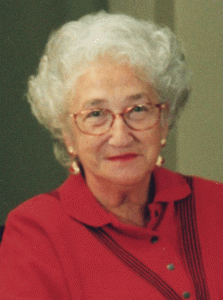By ERIN ELLIOTT /Â Community News Editor
Born in a Polish town along the German border, Rosa Nisenholz was just 14 years old when she was marched to the first of several forced labor camps in 1939. Four years later — and weighing only 68 pounds — she “graduated,” in her words, from the Bergen-Belsen concentration camp.
“She was very open. She always told us, from the time we were able to understand, about her background, about her history and what she suffered,” said Linda Eisenstadt, Nisenholz’s daughter. “She was a survivor to her fingertips and she passed that on, that survivor instinct.”
Nisenholz died April 11 in St. Paul. She was 83.
At the end of World War II, Nisenholz was liberated by the British and airlifted to Sweden, where she spent 10 months recuperating. She placed an ad in the Yiddish Forward looking for her American relatives and was reunited with them in New York, before joining them on Portland Avenue in St. Paul.
She met her husband, David Nisenholz, at a neighborhood party. Born on the opposite side of Poland, David was the youngest of eight children and had been hidden with a Polish Christian family during the war. He later fought with Soviet Jewish partisans.
David used a Jewish organization to find his American relatives and came to St. Paul in 1946. He lived with his relatives on Ashland Avenue in St. Paul, one block from Portland.
The Nisenholzes were the first survivor couple married at Temple of Aaron in 1948. The family expanded to include daughters Florie and Linda, and son Steven.
As a child, Eisenstadt remembers the smells of her mother’s homemade chopped liver, blintzes and gefilte fish.
“I still remember going with her to a fish market on the east side of St. Paul to pick up carp and whitefish,” Eisenstadt said. “She brought them home and she put them in our laundry tub, the fish were swimming in our laundry tub, until she was ready to knock them out, kill them and fillet them. Then, she made gefilte fish like nothing you’ve ever tasted.”
In the early 1970s, Nisenholz worked as a cashier at Applebaum’s and Lunds. Barely five feet tall, she had to stand on a box behind the register and always had the longest line in the store.
“When someone would come through her line, especially if it was a young girl, and she would see that they had a few containers of yogurt in the cart, she would leave her register, take the girl by the hand, fill up the cart with healthy food, bring it back, pay for it and have the girl home for dinner,” Eisenstadt said. “She was a little lady who only knew how to give.”
Though her mother didn’t get past eighth grade, Eisenstadt described her as “smarter than anyone I knew.” Eisenstadt said her mother read as much as she could and asked a lot of questions. Because she learned English phonetically, she wasn’t the best speller, but she was fluent in Yiddish and German, and also knew some Swedish, Russian, French and Hebrew.
With her “business acumen,” she made smart investments and was among the first people to pursue reparation money from the German government.
Nisenholz spoke often of her experience during the Holocaust and shared her story with people of all ages and backgrounds. Her legacy now lives on in her son, who is instrumental in getting Chicago’s Holocaust museum up and running.
“He’s making sure that nobody ever forgets that this happened, and that people survived and lived on,” Eisenstadt said. “I’m very proud of my mom, always have been. She made the most out of her life.”
Eisenstadt, who lives in Mendota Heights, is also a survivor. She is celebrating 10 years as a survivor of two cancers and described her mother as her “rock.”
“She said to me that a positive attitude is 95 percent of everything,” Eisenstadt said. “And she was absolutely right.”
In his eulogy, Rabbi Alan Shavit-Lonstein saw Nisenholz’s attitude, among her many other attributes, as an inspiration.
“Her ability to enjoy some of the small pleasures of this world, when we can understand that she would see only bitterness, is to be praised,” he said. “Her life, attitude and energy still serve as an inspiration to many.”
Nisenholz is survived by her three children and five grandchildren. She was preceded in death by her husband, David.



















